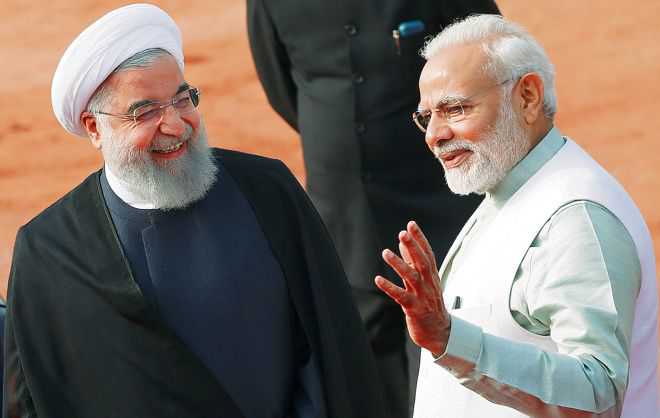
The catch: India must redouble efforts on the Chabahar project, even though Iran wishes to develop strong links with Gwadar Port and favours China’s BRI.
Vivek Katju
Ex-secretary, ministry of external affairs
The Trump administration has decided to deny further exemptions from sanctions to India and a few other countries for the purchase of Iranian oil. It has tried to cushion the decision’s adverse impact on the global oil market by encouraging higher production. The Modi government has, in response, stated publicly that it will ensure that supplies from other countries are tied up so that India’s oil needs are secured. Its comment indicates that India would accede to US sanctions.
In this context, four points may be made: First, India’s national ethos, since Independence, not only reflexively reacts against foreign pressure, it also wants it to be publicly condemned. This is especially so if it comes, or is perceived to be coming, from the West, especially the US. This attitude stems from India’s socialist past and the desire for a foreign policy rooted in principles and moral imperatives. Idealism is fine, but the fact is that interstate relations are essentially transactional. Major states accept this more easily than developing countries. It is time that India does so too, for it is now acknowledged as a power that has emerged to global status. It should not be reluctant to play the diplomatic game without posturing. A decision on import of Iranian oil has to be taken in this light and not blindly standing on principle.
Second, the Congress’ criticism of the government’s quiet approach is largely election-related. It has overlooked its own conduct. In September 2005, and later too, it stood with the US and other Western countries in voting against Iran at the International Atomic Energy Commission for its N-programme. Iran threatened a fallout on Indo-Iranian economic ties. However, the UPA government continued to vote against Iran on this issue and Iran, too, did not disrupt bilateral economic ties.
Importantly, the UPA government had also reduced oil imports from Iran during its term. They rose after the Iran nuclear deal during the Obama administration to reach their highest around 27 million tonnes; consequently, Iran became the third largest source for India’s oil imports.
Third, some American ‘sources’ have indicated that as their country has shown sensitivity to Indian interests in taking on China regarding the listing of JeM chief Masood Azhar as a designated terrorist, India must pay back through stopping Iranian oil imports. The Azhar listing will objectively constitute an Indian diplomatic success, even if it will not materially impact Pakistan’s sponsorship of cross-border terrorism. If such a listing comes during the election campaign, as is likely, it may give the BJP an occasion to project Modi’s diplomatic prowess. However, if there was a choice between avoiding sanctions and the Azhar listing, the latter should not obviously prevail. There is perhaps no choice because of Trump’s Iran obsession. In such a situation, Indian diplomacy should obviously try to find a way to keep the Iranian oil purchase going, but that cannot be at the cost of Indian oil companies that have big stakes in maintaining links with the US oil industry and also avoiding constraints on their international financial transactions.
Fourth, Iran has always pursued a calibrated and transactional policy with India. During the Shah’s period, it tilted towards Pakistan, for the two countries were part of the America-led alliance. Later, it sought to balance India and Pakistan, but on J&K its position is closer to Pakistan. During Pakistan PM Imran Khan’s official visit to Iran last week, the Iran-Pakistan joint statement noted that both sides wanted the J&K issue to be resolved on the basis of the ‘will of the people of that region and in line with the resolutions of the UNSC’. This is far from India’s standpoint.
India has successfully avoided getting entangled in the internecine quarrels of West Asia. By maintaining excellent bilateral ties with individual West Asian states, which may be mutually antagonistic, India has built productive ties with Saudi Arabia, Iran, the UAE, Qatar and Israel. It has maintained its position on Palestine. There is an alignment between the major Arab peninsular states, Israel and America against Iran. But India has not got in the crossfire. Indian diplomats will now have to make it clear to Iran that they will do their utmost to cushion the impact of US sanctions on Indo-Iran cooperation in the oil sector, but they will look for Iranian understanding where Indian energy security and wider economic interests are concerned.
Certainly, it can be expected that India will enhance its relations with Iran in all fields, including the security sector, despite US sanctions against the Iranian Revolutionary Guards. Particularly important is progress in connectivity cooperation. Thus, India must redouble efforts to make progress in the Chabahar Port project, even though Iran wishes to develop strong links between this port and Gwadar and looks favourably towards China’s Belt and Road Initiative (BRI). Iran is no doubt aware of Indian sensitivities on both the BRI and the development of Gwadar, which is the lynchpin of the China-Pakistan Economic Corridor. Is it forgoing its interests because of Indian concerns?
Iran is an important regional country and its influence is felt in the region as a whole. It is a player in Afghanistan and Indo-Iran-Russian cooperation in the 1990s helped prevent the Taliban from taking over the entire country. That is now a matter of the past, for Iran’s Afghan approach has changed. Significantly, even in the 1990s Iran did not hesitate, despite the cooperation on Afghanistan, to ruthlessly secure its interests in other areas of bilateral cooperation. That is how the diplomatic game is played. Iran knows this better than most countries.



























